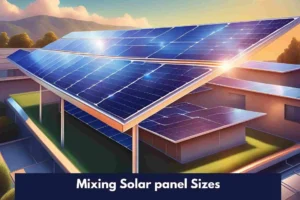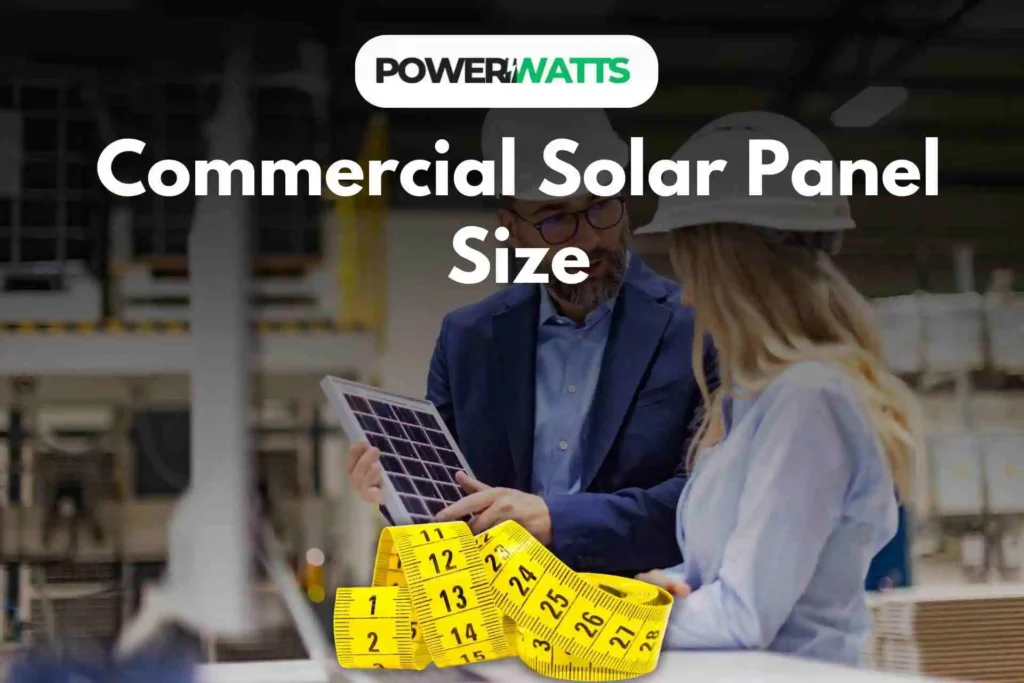Are you ready to utilize solar power and grow your business? Let us investigate commercial solar panel sizes. Commercial solar panels may help companies lower their carbon footprint and energy expenditures. These panels transform solar power into clean as well as renewable energy for offices as well as factories and other commercial enterprises. Maximizing solar energy advantages requires selecting the proper size commercial solar panels.
Strategically placed commercial solar panels might power your firm fully on green energy. The basic panel sizes are 72-cell and 96-cell. But, consider roof space, energy usage, and money when choosing a company size. Larger companies with significant roof space may use 96-cell panels to satisfy their energy needs, while smaller firms may find 72-cell panels suitable and cheaper.
In the blog, we will explain commercial solar panel sizes including how to choose the best size for your company as well as their advantages and additional factors.

Common Commercial Solar Panel Sizes
When it comes to business solar panels, the most common shapes are based on how many solar cells they have. These are the two main configurations:
72-Cell Panels
- The size is about 77 inches long and 39 inches wide (3.25 ft x 6.42 ft).
- Most of the time, they vary from 400 to 500 watts.
- Weight: Most of the time, weigh around 50 pounds.
- Use: This is perfect for middle to big-business setups.
96-Cell Panels
- It’s about 3.5 feet wide and 6.5 feet long (41.5 inches wide and 78 inches long).
- The wattage range is from 500 to 600 watts.
- Weight: More than 60 pounds, which is heavier than 72-cell panels.
- Use: It can be used for big business projects or setups on a utility scale.
Which Size is Best for Commercial Solar Panels?
The best size for commercial solar panels relies on some things, such as how much energy your business uses, how much room you have for placement, and your budget. To help you decide, here are some things to think about:
Energy Demand:
Figure out how much electricity your business uses. Businesses that need a lot of electricity may find that panels that are bigger and put out more power are more efficient because they can make more electricity with fewer panels.
Installation Space:
Look at the space on the roof or ground that you have available for placement. If you don’t have a lot of room, putting a few bigger panels may be better than a bunch of smaller ones.
Budget Conscious:
Larger panels usually cost more upfront, but because they are more efficient, they can save you more money in the long run. When choosing panel sizes then think about your income and the ways you can pay for them.
Local Regulations and Incentives:
Find out what the rules are in your area about installing solar panels and if there are any benefits for business solar projects. But, if you are not sure how to find these solutions then Get a Quote for customized help.
Additional Factors Influencing Solar Panel Size Selection
- Panel Efficiency: Different brands and types of technology can make solar cells more or less efficient. Panels with higher efficiencies can make more energy with less room, which is good for making better use of space.
- Roof Orientation and Shading: The way your roof is angled and any nearby buildings or trees that might block the sun can affect how well your solar panels work. Make sure that the panels get enough sunshine all day long.
- Type of Installation: Think about whether you want to put the panels on top of a building or on the ground. Systems that are mounted on the ground might be able to use bigger panels, while systems that are mounted on the roof might need smaller ones.
- Type of technology used in solar: Different types of solar technology like monocrystalline as well as polycrystalline and thin-film, come in different sizes and work in different ways. Monocrystalline panels are often more efficient, but they may be bigger. Thin-film panels, on the other hand, can be lighter and more flexible.
Conclusion
Choose the proper size commercial solar panels to maximize energy output and ensure a successful solar installation. Businesses may choose panels that meet their energy demands and budget by studying panel size as well as wattage and variables.
Commercial solar panels are usually 72-cell or 96-cell and 400–600 watts. Your business’s size depends on energy use, installation space, and finances. Get a Quote Contact for a consultation on the finest commercial solar panel choices for your company. Switching to solar energy may save money and help the environment. Take advantage of solar electricity for your company!
FAQs
How much roof space is needed for commercial solar panels?
Roof space varies on panel count. A 72-cell panel takes 21 square feet on average.
Can I install solar panels on a flat roof?
Solar panels may be mounted on flat rooftops utilizing tilting mounting devices for best sunshine exposure.
What is the lifespan of commercial solar panels?
Most commercial solar panels last 25–30 years with little performance decline.
How do I determine my business’s energy needs?
See your typical monthly energy use on your power bills and contemplate potential growth or modifications.
What is the difference between monocrystalline and polycrystalline panels?
Monocrystalline panels produce more energy and take up less area than polycrystalline panels, which are cheaper but need more space.
Can solar panels function in rain or clouds?
Solar panels can produce power in foggy or wet weather, but their efficiency will be lower.
What are the environmental benefits of commercial solar panels?
Solar panels provide sustainable energy as well as minimize greenhouse gas emissions and reduce fossil fuel consumption.
What distinguishes grid-tied and off-grid solar systems?
Off-grid solutions need battery storage, whereas grid-tied systems consume electricity from the utility grid.


